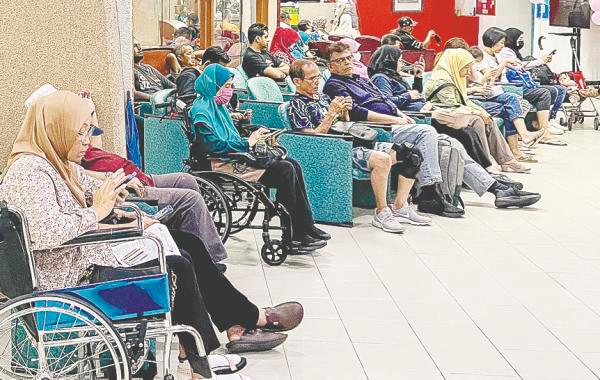PETALING JAYA: As Singapore contends with a surge in Covid-19 cases, with two-thirds involving the FLiRT variant, a medical specialist has called for decisive action on the healthcare staff shortage in Malaysia.
Universiti Kebangsaan Malaysia public health medicine expert Prof Dr Sharifa Ezat Wan Puteh, stressed the need for immediate medical reinforcements to prepare for possible outbreaks in the country.
As of June 1, the Health Ministry KKMNow portal reported 234 new Covid-19 cases. It conducted 2,209 tests resulting in an 11% positivity rate and 78 hospital admissions.
From December 2023 up to the end of May, 64% of beds in the country were occupied.
“Despite Malaysia’s relatively controlled Covid-19 situation, complacency could be dangerous. We need to employ more doctors in the government service and this should be given priority,” she said.
Sharifa also cited Senator Dr R.A. Lingeshwaran’s statement on June 2, in which he said Health Ministry data showed that 3,046 contract doctors had resigned over the past three years.
She said it is important to seriously analyse the country’s healthcare predicament and how it might struggle with insufficient medical staff.
“We are already facing a manpower shortage with an inadequate number of surgeons causing delays in surgeries, and a high volume of outpatients.
“The prospect of another serious Covid-19 outbreak raises concerns about the availability of beds, medical supplies, and adequately trained personnel to handle emergencies.”
A Malaysian Medical Association (MMA) survey also confirmed that about 95% of public healthcare facilities nationwide are struggling with insufficient manpower.
The poll conducted by MMA’s Section Concerning House Officers, Medical Officers and Specialists revealed that only 5% of public healthcare facilities are adequately staffed.
In the survey involving a total of 117 respondents from government healthcare facilities across the country, 32% said they needed to increase manpower by 50%, while 46% said they required a 100% increase.
Nearly half of the respondents, or 48.3%, said manpower shortages were due to doctors either quitting or being transferred, while 43.6% said there was some form of facility or equipment failure at their workplace.
“As the number of patients continues to surge at hospitals and clinics, healthcare workers are confronted with the unfair dilemma of choosing between their well-being and caring for their patients.”
By taking prompt actions, Sharifa said pressure on the healthcare system can be reduced.
“The government must create new positions and retain existing staff by offering competitive remuneration for healthcare personnel.
“Such an investment, although substantial, is essential to ensure healthcare access, particularly for middle to low-income populations, since high-income individuals often have private healthcare options.”
Sharifa also said the government should rehire retired healthcare professionals on a locum or short-term basis, especially in densely populated areas.
She also urged the public to remain vigilant, practise recommended health measures, and support efforts to bolster the healthcare infrastructure.
Those with comorbidities, especially chronic diseases, with low immunity and pregnant women are urged to wear masks in crowded places with poor ventilation to prevent infection.









